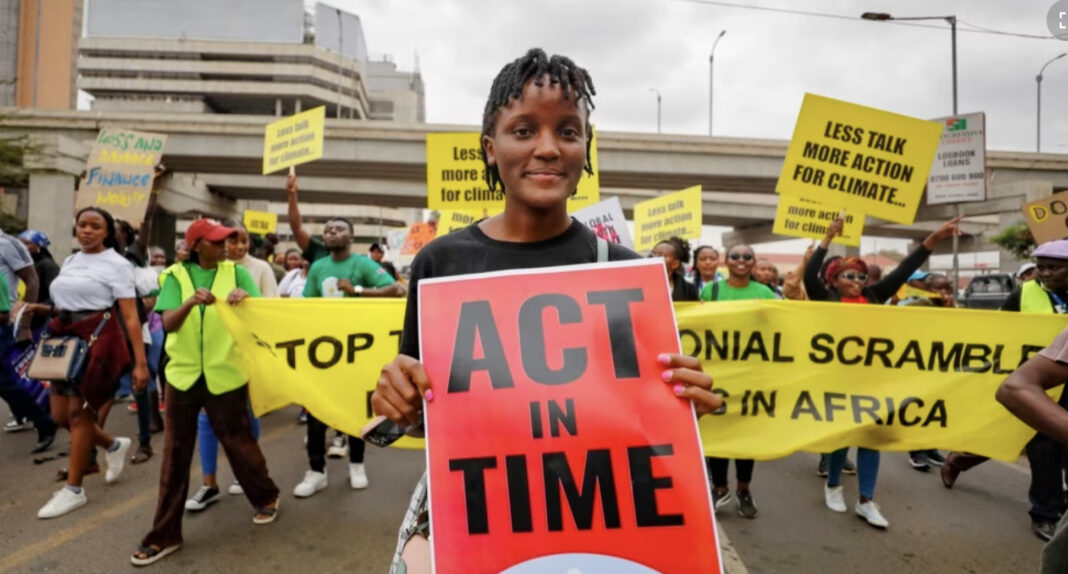Thousands of families displaced, wildlife habitats — home to vulnerable species such as elephants and chimpanzees — threatened, and carbon emissions increased. These are some of the risks from a planned oil pipeline stretching from Uganda’s Lake Albert to Tanzania’s Indian Ocean coast, environmentalists say.
Activists say these considerations have led to several Western banks ruling out financing the more than 1,400-kilometer (870 miles) East Africa Crude Oil Pipeline (EACOP), but they expressed concern over news this week that Chinese financiers Sinosure and the state-owned Export Import Bank of China could be throwing their weight behind the project instead.
“We take issue with the reports that China is keen to fund the EACOP project despite our documentation of the environmental and social damages of this investment,” Diana Nabiruma, a spokesperson for the Africa Institute for Energy Governance in Uganda, told VOA.
The nongovernmental organization is part of a coalition of groups that make up the #StopEACOP campaign.
“China has maintained that they’re a friend of Africa, as such they must reconsider EACOP and invest in clean energy instead of fossil fuels. … We urge China to stand on the right side of history by rejecting EACOP and funding Africa’s renewable future,” Nabiruma added.
France’s TotalEnergies has a 62 percent stake in the multibillion-dollar project, the Uganda National Oil Company and the Tanzania Petroleum Development Corporation each hold a 15 percent stake, and the China National Offshore Oil Corporation holds an eight percent stake.
The project has a debt equity ratio of 40:60, meaning more than half the costs need to be secured as debt.
Reuters and Agence France-Presse quoted Irene Batebe, permanent secretary for Uganda’s Ministry of Energy and Mineral Development, saying this week that Kampala was in advanced talks with the Chinese financiers to provide credit for the pipeline.
“We are confident, by the end of October of this year, we should close the debt component,” she told Reuters, adding that Sinosure would be “one of the biggest” contributors to the debt, without giving the exact amount they would be providing.
She also noted environmental groups had pressured Western lenders not to finance the project due to damage to the environment and concerns that funding a fossil fuel project could lead to climate change, adding that China had then stepped in to fill the gap.
“We did have other friends who were willing to come onboard and that’s where we looked, we became Eastern looking,” she said.
Asked by VOA to comment on the StopEACOP campaign’s reports they had decided against funding the project, Germany’s Deutsche Bank and the United States’ Citi both declined to comment.
VOA’s emails to the Chinese embassies in Uganda and the U.S. went unanswered, as did emails to Sinosure.
A Greener BRI?
Chinese President Xi Jinping recently announced a shift in his Belt and Road Initiative, away from the large infrastructure projects of the past — such as railways and ports — toward “small and beautiful” projects, which in part focus on China’s so-called Green Silk Road.
While Xi has been praised by some analysts for his 2021 pledge to not build any more coal plants abroad, others have noted that he is still working hard on securing oil and coal flows into China itself to make sure the world’s second-largest economy is energy secure.
Samuel Okulony, director of Uganda’s Environment Governance Institute, which is also part of the #StopEACOP campaign, told VOA that new funding from Chinese financiers would raise questions about Xi’s green pledges.
“This is the double-speak that we condemn. We’re tired of leaders using newspapers and big platforms to make promises that are meant to hoodwink the public but have no plans to act on them,” he said.
Work on the pipeline started this year, with commercial oil production expected to begin in 2025, despite the fact the European Union’s parliament adopted a resolution last year criticizing the project.
The need for energy infrastructure
Ugandan President Yoweri Museveni made news last year when he criticized the West and praised China for investing in the energy infrastructure needed on the African continent.
He said the West’s insistence on Africa using green energies, while it continues to use fossil fuels itself, means millions of Africans being left without access to electricity.
But Ugandan environmentalist Okulony told VOA “there’s no evidence across the continent of oil project-affected communities in Africa benefiting from the oil extracted in their regions. What has followed is plunging of communities into abject poverty.”
In the case of EACOP, activists say communities that moved to make way for the oil project will lose their farms and livelihoods, and that the pipeline could contaminate fresh water sources relied on by millions of people.
However, there are Western companies involved with EACOP too. China is the smaller international shareholder in the project, while TotalEnergies is the largest.
VOA asked whether the French giant was concerned about the risks activists say the pipeline poses.
“The project partners fully recognize the sensitive nature of the areas in which they are working,” a company spokesperson, Stephanie Platat, replied. “It is important to state that once constructed, the pipeline will be buried, and the right of way reinstated such that humans and animals can cross freely along its entire length.”
She added that international requirements were being adhered to during the construction phase to “address potential biodiversity and ecosystem services impacts. For example, the pipeline route was defined to minimize its environmental impact and avoid sensitive areas as much as possible.”
Even with TotalEnergies’ assurances, organizations in Tanzania and Uganda and international groups including Greenpeace and Human Rights Watch warn that the pipeline project will have heavy social and environmental consequences.

